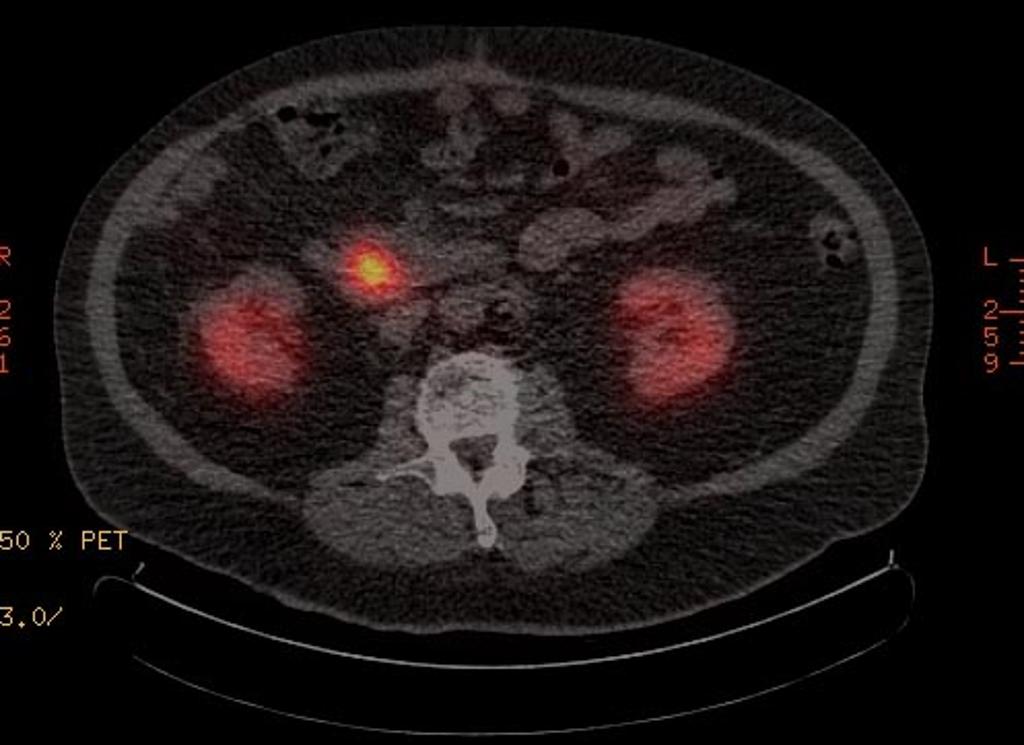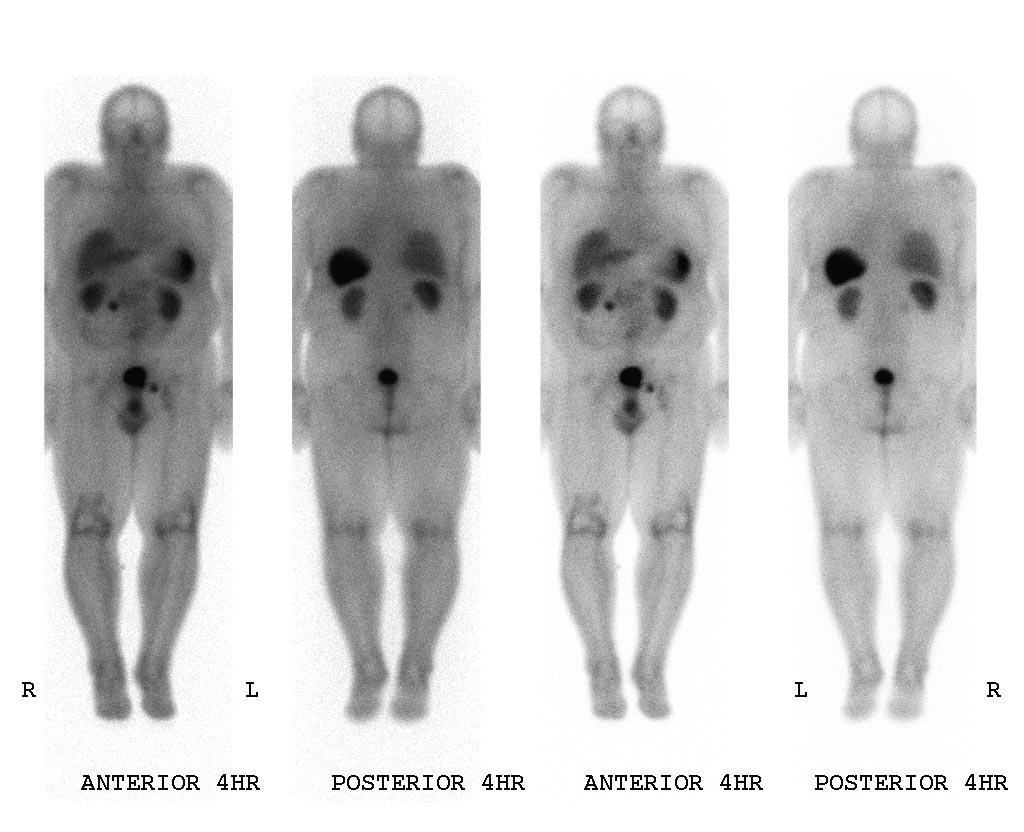Insulinoma other imaging findings
|
Insulinoma Microchapters |
|
Diagnosis |
|---|
|
Treatment |
|
Case Studies |
|
Insulinoma other imaging findings On the Web |
|
American Roentgen Ray Society Images of Insulinoma other imaging findings |
|
Risk calculators and risk factors for Insulinoma other imaging findings |
Editor-In-Chief: C. Michael Gibson, M.S., M.D. [1]Associate Editor(s)-in-Chief: Amandeep Singh M.D.[2]
Overview
The other imaging studies include Positron Emission Tomography(PET) and Somatostatin Receptor Scintigraphy(SRS) which are nuclear studies used for detecting somatostatin receptor especially subtype 2 using radioisotopes of Gallium. The increased uptake of radioligands is suggestive of insulinoma. The metastasis also shows the increased uptakes. The sensitivity of PET is increased by doing a CT scan coupled with PET scan. The sensitivity of SRS is 50-60% as insulinomas have less somatostatin subtype2 receptor which is detected by the test.
Other Imaging Findings
Positron Emission Tomography

- Positron emitting radioisotopes of Gallium such as 68 Gallium-DOTATAC, 68 Gallium-DOTATATE, and 68 Gallium-DOTANAC can be used to detect the uptakes in areas of increased somatostatin receptors. The sensitivity is increased when it is coupled with CT scan although it is not approved for routine use in the United States. It is mainly used for investigation purpose.[1][2][3]
- Positron Emission Tomography(PET) may be helpful in the diagnosis of insulinoma. Findings on a PET scan suggestive of insulinoma include:
- Increased uptake in the affected part of the pancreas.
- Metastasis can also be detected in the same way
Somatostatin receptor scintigraphy

- Somatostatin receptor scintigraphy(SRS) may be helpful in the diagnosis of pancreatic neuroendocrine tumors including insulinomas. As many insulinomas do not express somatostatin subtype 2 receptors, it is less sensitive(50-60%).[4][5] [6][7][8]
Findings on an SRS suggestive of insulinoma include:
- Increased uptake of pentetreotide (synthetic somatostatin analogue)
- Increased uptake in sites of metastasis, commonly in hepatic involvement
References
- ↑ Sadowski SM, Neychev V, Cottle-Delisle C, Merkel R, Yang LA, Quezado MM, Chang R, Kebebew E (2014). "Detection of insulinoma using (68)Gallium-DOTATATE PET/CT: a case report". Gland Surg. 3 (4): E1–5. doi:10.3978/j.issn.2227-684X.2014.10.02. PMC 4244512. PMID 25493261.
- ↑ Gabriel M, Decristoforo C, Kendler D, Dobrozemsky G, Heute D, Uprimny C, Kovacs P, Von Guggenberg E, Bale R, Virgolini IJ (2007). "68Ga-DOTA-Tyr3-octreotide PET in neuroendocrine tumors: comparison with somatostatin receptor scintigraphy and CT". J. Nucl. Med. 48 (4): 508–18. PMID 17401086.
- ↑ Haug AR, Cindea-Drimus R, Auernhammer CJ, Reincke M, Wängler B, Uebleis C, Schmidt GP, Göke B, Bartenstein P, Hacker M (2012). "The role of 68Ga-DOTATATE PET/CT in suspected neuroendocrine tumors". J. Nucl. Med. 53 (11): 1686–92. doi:10.2967/jnumed.111.101675. PMID 22984220.
- ↑ Zimmer T, Stölzel U, Bäder M, Koppenhagen K, Hamm B, Buhr H; et al. (1996). "Endoscopic ultrasonography and somatostatin receptor scintigraphy in the preoperative localisation of insulinomas and gastrinomas". Gut. 39 (4): 562–8. PMC 1383270. PMID 8944566.
- ↑ Proye C, Malvaux P, Pattou F, Filoche B, Godchaux JM, Maunoury V; et al. (1998). "Noninvasive imaging of insulinomas and gastrinomas with endoscopic ultrasonography and somatostatin receptor scintigraphy". Surgery. 124 (6): 1134–43, discussion 1143-4. PMID 9854595.
- ↑ McAuley, G.; Delaney, H.; Colville, J.; Lyburn, I.; Worsley, D.; Govender, P.; Torreggiani, W.C. (2005). "Multimodality preoperative imaging of pancreatic insulinomas". Clinical Radiology. 60 (10): 1039–1050. doi:10.1016/j.crad.2005.06.005. ISSN 0009-9260.
- ↑ Behr T, Becker W, Koch W, Grebmeier J, Wolf F (1994). "[Somatostatin receptor scintigraphy in neuroendocrine tumors exemplified by a patient with hepatic metastases of gastrinoma]". Z Gastroenterol. 32 (2): 100–4. PMID 7513113.
- ↑ Jensen RT, Gibril F, Termanini B (1997). "Definition of the role of somatostatin receptor scintigraphy in gastrointestinal neuroendocrine tumor localization". Yale J Biol Med. 70 (5–6): 481–500. PMC 2589266. PMID 9825476.